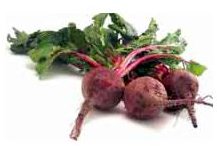Beets: The Health Benefits of Eating Beets
Beets are High in Nutritional Value
Beets are available year-round, but they are in season from June to October. While deep red beets are the most well-known, some varieties are available that are golden, white or other colors. A cup of beets contains only 74 calories, but is packed with nutrients, including folate, manganese, potassium, vitamin C, tryptophan, iron, copper and phosphorus. They should be stored in the crisper of the refrigerator, where they will keep for up to 4 weeks. The beet greens should be cut off and stored unwashed in a plastic bag, and should be used within 4 days.
Beets can be prepared in many ways. They can be baked, steamed or boiled, but should not be overcooked, as this destroys some of the nutrients. To prevent beets from bleeding, boil them whole with the skins on, then peel after cooking. Beets are excellent raw, and can be grated into salads, or added to vegetable smoothies.
The green leafy beet tops have even greater nutritional value than the deep red roots, and are a rich source of vitamins, minerals, carotenoids, riboflavin (vitamin B2), potassium, calcium and iron. The delicious beet greens are similar to chard or spinach, and can be steamed, sauteed, or eaten raw as part of a salad.
Health Benefits of Eating Beets
Cardiovascular Health- Beets contain betaine, a compound that acts to lower the amount of homocysteine in the blood. Homocysteine is a toxic molecule that damages arteries, and keeping the levels of homocysteine low can improve cardiovascular health and reduce the risk of atherosclerosis (hardening of the arteries). Studies have shown that beet juice lowers blood pressure, and beets decrease the levels of total cholesterol by up to 40% and also significantly lower triglycerides in the blood while increasing the amount of HDL (good cholesterol).
Liver Protection- Beets stimulate the activity of antioxidant liver enzymes, which enhance the liver’s detoxification activity and protect the body’s cells from damage from free radicals.
Cancer Prevention- Beets help the body fight cancer in several different ways. Betacyanin, the deep red pigment in beets, is a potent cancer-fighting substance. The high dietary fiber content of beets also aids in fighting colon cancer. In a study involving stomach cancer patients, beet juice was found to protect against the effects of nitrosamines, compounds that cause cell mutations that lead to cancer. Other studies indicate that beet fiber in the diet causes an increase in the number of special immune cells in the colon that find and destroy abnormal cells, resulting in a decrease in pre-cancerous changes in the colon.
Prevention of Birth Defects- Folic acid, or folate, is a B vitamin that is necessary for tissue growth and important in the prevention of certain birth defects such as spina bifida, in which the spinal column does not develop properly.
Reduction of Inflammation- The betaine found in beets also acts to decrease certain molecules that are indicators of chronic inflammation, a condition that is found in a variety of diseases including type-2 diabetes, Alzheimer’s disease, osteoporosis and heart disease.
Resources
The World’s Healthiest Foods www.whfoods.com
Image credit: US Government, CDC, Wikimedia Commons
